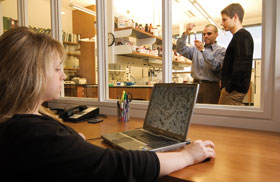  |
| HOME | THIS ISSUE | CALENDAR | GRANTS | BACK ISSUES | < BACK | NEXT > |
Professor focusing on human liver receives toxicology awardby Kenneth Best - December 11, 2006 |
||||
| José Manautou always had an inclination for science, particularly biology and chemistry. He was fascinated by the biology of the body, human diseases, and the treatment of disease. After considering medicine and other health care fields, he opted for a career in pharmaceutical sciences. "Pharmacy was a good choice for me," he says. "You're still involved with the treatment of patients, and it gives you a great foundation for jumping into a professional Ph.D. program and becoming a scientist." Manautou, an associate professor of pharmaceutical sciences, received the 2006 Achievement Award of the Society of Toxicology for significant contributions to the field of toxicology. The award has been presented since 1967 to the leading scientists in the discipline. In its citation, the society says that his "dedication to the training of young scientists is unmatched," and "his outstanding research and professional accomplishments place him among an elite few in the field of toxicology." A faculty member at UConn for 10 years, Manautou is one of the leading researchers in the field of toxicology. His work focuses on understanding how the interaction of chemicals alters the functioning of the human liver, with an emphasis on how a damaged liver can repair itself. The research is funded with a four-year grant from the National Institutes of Health. "The liver is interesting in comparison to other organs," he says. "You can damage the liver, and if the damage is not overwhelming, with time it repairs itself and it appears normal. We're trying to study aspects of this mechanism." Manautou has built his research on long-time study of the drug acetaminophen, known commercially as Tylenol, which is safe when taken in recommended doses but can produce toxic byproducts in the liver when consumed in higher quantities. Abuse of the drug can occur when patients take the suggested dosage and then use another over-the-counter medication that also includes acetaminophen, unknowingly raising the potential for toxicity.
At the same time, the general warning about not using alcohol while taking medication also applies to acetaminophen, since alcohol consumption accelerates the metabolization of the drug into the toxic form that can damage the liver, Manautou says. He says his work with students is a natural extension of the mentoring he received from a variety of key individuals during his training as a young scientist, including Steven D. Cohen, professor emeritus of pharmaceutical sciences, who advised him during post- doctoral work at UConn. "I was blessed from the moment I was an undergraduate all the way through graduate school," Manautou says. "It's a matter of continuing the legacy of my former mentors by bringing new people into the field, training them, and guiding them to the path of success. I'm a good example of what good mentoring can do for students with talent." He says his students are exposed to all aspects of his work, including his work with the Society of Toxicology and his service on grant review committees for the National Institutes of Health in Washington, D.C. "They see what I do on a daily basis, so they know not only that I'm there to guide their research work and supervise them, but they're exposed to the things I do as a member of the scientific community," he says. "They get to see all these other things are important to the development of a well-rounded scientist." That includes Manautou's latest professional undertaking as associate editor of the journal Toxicology and Applied Pharmacology, a premier international journal in the field.
|
| ADVANCE HOME UCONN HOME |

